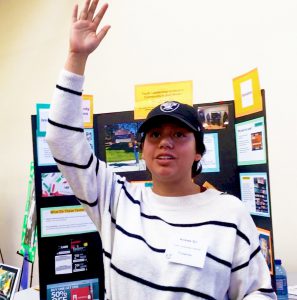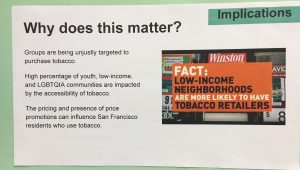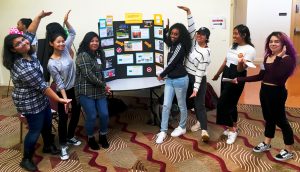An interview with Andrea Gil, youth leader in San Francisco’s Community Action Model
I am Bits and Pieces, Blended
My family is complex. I don’t have one identity. I have bits and pieces of different identities.

Both of my parents are from El Salvador – my mom is first generation, my dad was born there and moved here as a teen. But they are so different! My mom is the most educated woman I know, on all topics, from movies, to sports and politics, here and internationally. She’s more about diving into stories, understanding different views, having conversations with different people, community dialogue, which she draws on to form her opinions. She’s interested in issues of Central and South America, how the US has been involved. But she loves African American history and culture: it’s always 2pac, Lauryn Hill, Biggie on the radio when we drive together.
My dad is a revolutionary, a philosopher. He is more rebellious. He doesn’t consider himself a liberal or a conservative, a democrat or a republican. He forms his own views. He always says: “I don’t like to call myself an American just because we are in the US. Central and South America are part of America.” He doesn’t celebrate holidays because they are just another capitalist scheme to gain our money. He loves poetry and soccer, he works for Bay Area Scores coordinating soccer tournaments, and has worked at a restaurant for over 20 years. I think he would have been more involved in activism if he didn’t have to work so hard.
I’m a blended mix of the two. Both are readers and I became a reader, too. I’m grateful for my appreciation of poetry, the impetus to understand my own culture first. I’m actively reading, pushing my education, but forming my own voice at the same time. Both stimulated these conversations in me, both are proud of the work I’m doing on social justice.
My blended identity was also shaped by where I grew up. Hercules, California, is a very quiet place a few miles east of Richmond. It’s a good place to raise kids, to retire. It’s one of those towns you grow out of or end up staying for the rest of your life. When I mention where I’m from, most people say, “Oh, you’re not from the Bay Area.” But that’s not how I feel. My mom and dad split up when I was 3, and my dad moved to San Francisco. I spent weekends there, and got to know the City and appreciate the culture at a very early age. My dad moved to Oakland when I was 16, and I’d go out there and stay with him and I was part of that culture as well. Each area had its own culture and community.
It wasn’t until I began attending San Francisco State University that I began to meet people with similar backgrounds. But even here, I’ve struggled with feeling too cultured for the sorority I joined, and too Americanized for the Latino community in my Latino Studies program.
What Calls to Me is Action
My friend Itzel introduced me to YLI’s Community Action Model (CAM). She was interning at YLI at the time and was involved in social justice work around tobacco policy. At 20 years old, she was already a community organizer, going out into the neighborhoods where I have lived. She was growing as a leader, working hands-on in our community. She was doing something, she was learning the stuff we don’t learn in school. In this political climate, we need an outlet to express our views and work toward something that is creating positive change. The community I’m from – the Latino community, the youth – this government is against us. Their platform and their agenda does not align with the advancement of our people. I became very interested and she asked me if I wanted to be part of it. I joined at the beginning of the 2017-2018 school year and am now half way through the 2-year program cycle.
 The program began with workshops about levels of oppression within our society. When we learned about minimum pricing and price promotions, most of us wanted to go into tobacco policy. Minimum pricing laws don’t allow the tobacco industry to sell their products below a certain dollar amount, discouraging this unhealthy habit. Price promotions – like “Buy One Get One Free” or “2 for 1” used by the tobacco industry to get around minimum pricing laws – target people who are sensitive to prices: low-income communities and people of color. We live in these areas, these are our communities.
The program began with workshops about levels of oppression within our society. When we learned about minimum pricing and price promotions, most of us wanted to go into tobacco policy. Minimum pricing laws don’t allow the tobacco industry to sell their products below a certain dollar amount, discouraging this unhealthy habit. Price promotions – like “Buy One Get One Free” or “2 for 1” used by the tobacco industry to get around minimum pricing laws – target people who are sensitive to prices: low-income communities and people of color. We live in these areas, these are our communities.
This really became clear through our research. My favorite research method was Photovoice – you can learn a lot more from images than statistics on paper. We walked through the Tenderloin, Hunters Point, the Mission and took photos that illustrated how communities are living, how they are different from other parts of the Bay Area. There’s a liquor store on every corner, there is nowhere to buy healthy food, it’s cheaper to buy a bag of chips than quality vegetables. One photo showed big posters with promotions in a parking lot near a store, where everyone can see it. Another photo highlights how big, colorful advertisements are displayed at a child’s visual level. This is what society is putting forward for us to see.
Other research strategies included interviews with key informants – other organizers who shared their research, what they found, what they would have done differently. We also created a survey that we conducted to over 300 people. I was surprised by the high percentage of people who recognized the negative impacts price promotions have on children and adolescents, and the number of people in favor of minimum pricing. How is it that the tobacco industry continues to work against us?
Our research this year is culminating in a series of presentations – we just completed our first one at CAM JAM at the African American Art & Culture Complex. Our ultimate goal is to make policy change in San Francisco.
This Work is Rooted
All of us at YLI have background stories. I like to hear what other CAM members think, what lens they are looking through. We’re all able to be real and see what’s going on – when we hear about something that has happened, we all get fired up. We recognize how we are all affected as a whole and this has helped to shape me as a leader.
Moving forward, the issue I want to work on is education. I’ve always gravitated towards it, my research in school has been about it. I went to a public school and saw with my own eyes that we are in need of more teachers and resources. I saw schools that had money, where everyone has a laptop at age of 15. I also want to fight hunger. Working in the Mission, I see so many people go without being fed because they don’t have the money or resources. As a society, we’re failing them. At the end of the day, we’re all human beings.
This work is rooted in who I am. One of the most valuable thing I’ve ever learned is simply being nice to other people. My grandparents moved in when my parents split up, and my grandma always had my friends over, always fed them. There was always another place at the table for one more. Being there for other people is the biggest thing I strive for, to make good on the values I was taught. And now I have the skills and tools I need to continue doing community organizing.

